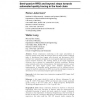Free Online Productivity Tools
i2Speak
i2Symbol
i2OCR
iTex2Img
iWeb2Print
iWeb2Shot
i2Type
iPdf2Split
iPdf2Merge
i2Bopomofo
i2Arabic
i2Style
i2Image
i2PDF
iLatex2Rtf
Sci2ools
81
Voted
IJRFITA
2007
2007
Semi-passive RFID and beyond: steps towards automated quality tracing in the food chain
: Precise temperature monitoring is the major precondition to supervise quality losses within the transport chain for fresh products. Different types of miniaturised data loggers with electrical and semi-passive RFID interface were compared and applied to record spatial temperature profiles for typical transport situations. The resulting effects of the found temperature variations were evaluated by mathematical shelf-life modelling. Wireless sensor networks with active communication offer permanent access to sensor condition but entail higher system costs. Different approaches for implementation of integrated quality assessment will be discussed using a concept for shelf-life calculation on RFID-level and the intelligent container as demonstrator for an automated transport supervision system.
IJRFITA 2007 | Precise Temperature Monitoring | Spatial Temperature Profiles | Typical Transport Situations |
| Added | 15 Dec 2010 |
| Updated | 15 Dec 2010 |
| Type | Journal |
| Year | 2007 |
| Where | IJRFITA |
| Authors | Reiner Jedermann, Walter Lang |
Comments (0)

